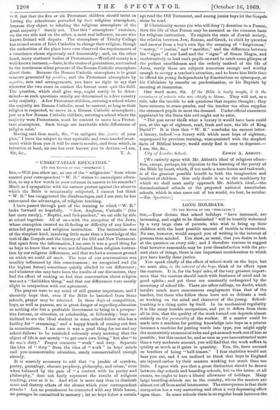" UNSECTARIAN EDUCATION."
(TO THE EDITOR OF THE " SPECTATOR:1
SIR,—Will you allow me, as one of the " religionists " from whose control your correspondent " W. B." wishes to emancipate educa- tion, to say a few words in your columns in answer to his remarks? Much as I sympathize with his earnest protest against the abuse to which the Bible is occasionally subjected, I cannot but think " W. B." has exaggerated the disadvantages, and I am sure he has extenuated the advantages, of religious teaching.
I have passed through part of the training to which " W. B." looks forward so hopefully. "Jew, Anglican, Catholic" (the last more rarely), " Baptist, and Independent," we sat side by side at school together. All of us—with the exception of the Jews, whose exemption created no ill-feeling or difficulty of any kind— attended prayers and religious instruction. The instruction was of the simplest kind, involving little more than a knowledge of the text of.tbe Gospels and the history of the Old and New Testament. But apart from the information, I am sure it was a good thing for us boys to know that we were not debarred from religious instruc- tion by our religious differences, and that we had a common ground on which we could all meet. The tone of our conversations was sensibly influenced by this consciousness ; we recognized and (in the highest forms) sometimes quietly alluded to our differences ; and whatever else may have been the results of our discussions, they had the effect of making us feel that conversation about religion was not a "forbidden thing," and that our differences were mostly slight in comparison with our agreement.
The prayers were to my mind of still greater importance, and I sincerely hope that, even if the Bible be banished from State schools, prayer may be retained. In these days of competition, boys, as well as parents, are in great danger of regarding education as nothing else but a profitable investment to bring in a prospec- tive fortune, or situation, or scholarship, or fellowship ; boys are inclined to see the ideal student in some school-fellow who has a facility for" cramming," and a happy knack of coming out first in examinations. I am sure it was a good thing for me and my school-fellows to be remiuded solemnly every morning that the object of life is not merely " to get one's own living," but also " to do one's duty." Prayer connects " work " and duty. Separate the idea of " duty" from the idea of " work" in boys' minds and you commercialize education, surely commercialized enough already.
It is scarcely necessary to add that "a jumble of murders, poetry, genealogy, obscure prophecy, philosophy, and crime," even when balanced by the gain of " a contact with its poetry and philosophy," does not fairly represent the results of religious teaching, even as it is. And what is more easy than to diminish some and destroy others of the abuses which your correspondent attacks ? Let no punishment be connected with any Bible lesson, no passages be committed to memory ; let no boys below a certain age read the Old Testament, and among junior boys let the Gospels alone be read.
If Christianity means (as who will deny ?) devotion to a Person, then the life of that Person may be assumed as the common basis for religious instruction. To explain the state of Jewish society, the relation between Jew, Roman, and Greek, to elicit by question and answer from a boy's own lips the meaning of " forgiveness,' " mercy," " justice," and " sacrifice," and the difference between the " signs" of our Lord and the " signs" of Simon Magus, and unobtrusively to lead one's pupils onward to catch some glimpse of the perfect unselfishness and the orderly method of the life of Jesus, surely these are subjects numerous enough and worthy enough to occupy a teacher's attention, and to leave him little time to offend his young Independents by dissertations on episcopacy, or his Calvinists by assaults on predestination, or his Baptists by sneering at immersion.
One word more, Sir. If the Bible is badly taught, it is the examiners of schools who are chiefly t.0 blame. They will not, as a rule, take the trouble to ask questions that require thought ; they have recourse to cram-puzzles, and the teacher too often supplies the crammed pupils to meet the demand. Under official examiners appointed by the State this evil ought not to exist.
"Did you never thinl what a luxury it would have been could you, at the age of eighteen, read, fresh and new, the life of King David ?" It is thus that " W. B." concludes his earnest letter_ A luxury, indeed !—a luxury with which most boys of eighteen, unprepared by previous training, unacquainted with the simplest facts of Biblical history, would surely find it easy to dispense.— I am, Sir, &c.,
[We entirely agree with Mr. Abbott's ideal of religious educa- tion, except, perhaps, his objection to the learning of the poetry of the Bible by heart, which, if not made a mere lesson and taskwork, is of the greatest possible benefit to both the imagination and intellect of children. Our only doubt is as to the machinery by which we shall most easily approach Mr. Abbott's ideal,—the denominational schools or the proposed national unsectarian schools, which in nine cases out of ten would, we fear, be secular. —ED. Spectator.]






























 Previous page
Previous page